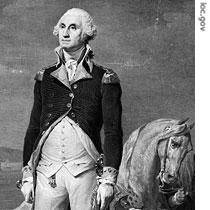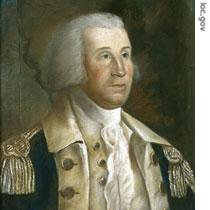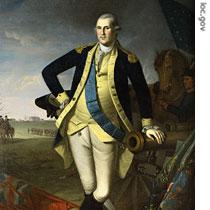-
(单词翻译:双击或拖选)
Welcome to THE MAKING OF A NATION -- American history in VOA Special English.
 |
| George Washington by artist Laugier |
The United States declared its independence from Britain on July fourth, seventeen seventy-six. The new nation was a loosely formed alliance governed under the Articles of Confederation. All this changed when a new plan of government, the Constitution, went into effect on March fourth, seventeen eighty-nine. There was much to be done to make it work. The machinery1 of government was untested. Strong leadership was needed. Today, Harry2 Monroe and Kay Gallant3 tell the story of America's first president, George Washington.
(MUSIC)
VOICE TWO:
Many historians believe there would never have been a United States without George Washington. He led the American people to victory in their war for independence from Britain. He kept the new nation united in the dangerous first years of its life.
Washington had a strange power over the American people. His name still does. During his lifetime, he was honored for his courage and wisdom. After his death in seventeen ninety-nine, he became almost god-like. People forgot that he was human, that he had faults and made mistakes.
For well over one hundred years, Americans found it difficult to criticize George Washington. He represented the spirit of America -- what was best about the country.
VOICE ONE:
Recent historians have painted a more realistic picture of Washington. They write about his weaknesses, as well as his strengths. But this has not reduced his greatness and importance in the making of the nation.
The force of Washington's personality, and his influence, was extremely important at the Philadelphia convention that wrote the new Constitution. Had he not agreed to attend, some say, the convention would not have been held. Later, as the first president, he gave the new nation a good start in life.
(MUSIC)
VOICE TWO:
 |
| George Washington by artist George Dunlap |
Washington was able to control political disputes among officials of the new government. He would not let such disputes damage the nation's unity4.
Washington often thought of the future. He wanted the first government to take the right steps.
He said, some things may not seem important in the beginning, but later, they may have bad permanent results. It would be better, he felt, to start his administration right than to try to correct mistakes later…when it might be too late to do so. He hoped to act in such a way that future presidents could continue to build on what he began.
VOICE ONE:
Washington had clear, firm ideas about what was right and what was wrong. He loved justice. He also loved the republican form of government.
Some people had difficulty seeing this part of the man. For Washington looked like an aristocrat5. And, at times, he seemed to act like one. He attended many ceremonies. He often rode through the streets in a carriage pulled by six horses. His critics called him "king."
Washington opposed rule by kings and dictators. He was shocked that some good people talked of having a monarchy6 in America. He was even more shocked that they did not understand the harm they were doing.
VOICE TWO:
Washington warned that this loose talk could lead to an attempt to establish a monarchy in the United States. A monarchy, he said, would be a great victory for the enemies of the United States. It would prove that Americans could not govern themselves.
As president, Washington decided7 to do everything in his power to prevent the country from ever being ruled by a king or dictator. He wanted the people to have as much self-government as possible. Such government, Washington felt, meant a life of personal freedom and equal justice for the people.
(MUSIC)
VOICE ONE:
The eighteenth century has been described as the age of reason and understanding for the rights of people. Washington was a man of his times. He said no one could feel a greater interest in the happiness of mankind than he did. He said it was his greatest hope that the policies of that time would bring to everyone those blessings8 which should be theirs.
Washington was especially happy and proud that the United States would protect people against oppression for their religious beliefs.
He did not care which god people worshipped. He felt that religious freedom was a right of every person. Good men, he said, are found all over the world. They can be followers9 of any religion…or no religion at all.
Washington's feelings about racial oppression were as strong as his feelings about religious oppression. True, he owned Negro slaves. But he hated slavery. "There is not a man alive," he once said, "who wishes more truly than I to see a plan approved to end slavery." By his order, all his slaves were freed when he died.
VOICE TWO:
 |
| George Washington at Princeton by artist Charles Willson Peale |
From the beginning, George Washington was careful to establish a good working relationship with the Congress. He did not attempt to take away any powers given to the Congress by the Constitution. By his actions, he confirmed the separation of powers of the three branches of the government, as proposed in the Constitution.
The Congress, too, was ready to cooperate. It did not attempt to take away any powers given to the president by the Constitution. The Congress, for example, agreed that President Washington had the right to appoint his assistants. But Congress kept the right to approve them.
(MUSIC)
VOICE ONE:
Washington asked some of the nation's wisest and most able men to serve in the new government.
For Secretary of State, he chose Thomas Jefferson. At the time, Jefferson was America's representative to France.
While Congress was considering Jefferson's nomination10, Washington heard of threatening events in France. He learned that a mob had captured the old prison called the Bastille. Washington was worried. The United States had depended on France for help during its war for independence. And it still needed French help. A crisis in France could be bad for America.
The information Jefferson brought home would prove valuable if the situation in France got worse. Washington also thought Jefferson's advice would be useful in general, not just on French developments.
VOICE TWO:
For Secretary of the Treasury11, Washington chose Alexander Hamilton. Hamilton had served as one of Washington's assistants during the Revolutionary War.
For Chief Justice of the United States, he chose John Jay. Jay helped write the Federalist Papers, which are considered the best explanation of the Constitution ever written. Two delegates to the Constitutional convention were named associate justices of the Supreme12 Court: James Wilson and John Rutledge.
For Attorney General, Washington wanted a good lawyer and someone who supported the Constitution. He chose Edmund Randolph of Virginia. It was Randolph who proposed the Virginia Plan to the Philadelphia convention. The plan became the basis for the national Constitution. Randolph refused to sign the document, because he did not believe it could be approved. But he worked later to help win Virginia's approval of the Constitution.
VOICE ONE:
President Washington named his assistants, and the Congress approved them. The president was ready to begin work on the nation's urgent problems. And there were many.
One problem was Spain's control of the lower part of the Mississippi River. American farmers needed to use the river to transport their crops to market. But the Spanish governor in Louisiana closed the Mississippi to American boats.
There also were problems with Britain. The United States had no commercial treaty with Britain. And Britain had sent no representative to the new American government.
Equally urgent were the new nation's economic problems. Two major issues had to be settled. One was repayment13 of loans made to support the American army in the war for independence. The other was creation of a national money system. Both issues needed quick action.
Finding solutions would be the job of President Washington's treasury secretary, Alexander Hamilton. Alexander Hamilton will be our story next week.
(MUSIC)
ANNOUNCER:
Our program was written by Harold Braverman. The narrators were Harry Monroe and Kay Gallant. Join us again next week for THE MAKING OF A NATION, an American history series in VOA Special English. Our programs are online with transcripts14, MP3s and podcasts at voaspecialenglish.com. You can also learn about the history of the series itself. THE MAKING OF A NATION was first broadcast in nineteen sixty-nine, ten years after VOA started Special English.
 收听单词发音
收听单词发音
1
machinery

|
|
| n.(总称)机械,机器;机构 | |
参考例句: |
|
|
|
2
harry

|
|
| vt.掠夺,蹂躏,使苦恼 | |
参考例句: |
|
|
|
3
gallant

|
|
| adj.英勇的,豪侠的;(向女人)献殷勤的 | |
参考例句: |
|
|
|
4
unity

|
|
| n.团结,联合,统一;和睦,协调 | |
参考例句: |
|
|
|
5
aristocrat

|
|
| n.贵族,有贵族气派的人,上层人物 | |
参考例句: |
|
|
|
6
monarchy

|
|
| n.君主,最高统治者;君主政体,君主国 | |
参考例句: |
|
|
|
7
decided

|
|
| adj.决定了的,坚决的;明显的,明确的 | |
参考例句: |
|
|
|
8
blessings

|
|
| n.(上帝的)祝福( blessing的名词复数 );好事;福分;因祸得福 | |
参考例句: |
|
|
|
9
followers

|
|
| 追随者( follower的名词复数 ); 用户; 契据的附面; 从动件 | |
参考例句: |
|
|
|
10
nomination

|
|
| n.提名,任命,提名权 | |
参考例句: |
|
|
|
11
treasury

|
|
| n.宝库;国库,金库;文库 | |
参考例句: |
|
|
|
12
supreme

|
|
| adj.极度的,最重要的;至高的,最高的 | |
参考例句: |
|
|
|
13
repayment

|
|
| n.偿还,偿还款;报酬 | |
参考例句: |
|
|
|
14
transcripts

|
|
| n.抄本( transcript的名词复数 );转写本;文字本;副本 | |
参考例句: |
|
|
|















